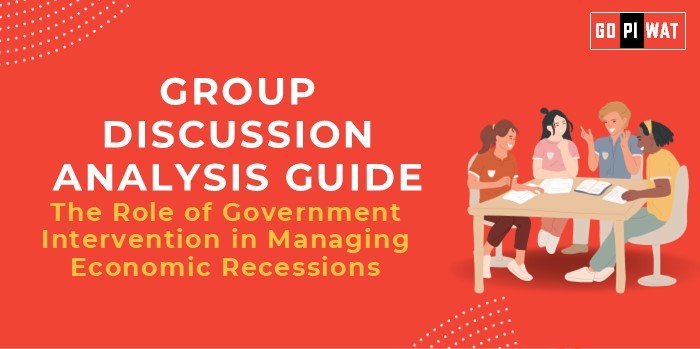📋 Group Discussion Analysis Guide
📉 Topic: The Role of Government Intervention in Managing Economic Recessions
🌍 Introduction
Economic recessions are cyclical downturns characterized by significant declines in economic activity. Governments worldwide have utilized various interventions to mitigate their impact, from fiscal stimulus to monetary policy.
Historical examples, like the Great Depression, and modern recessions, such as the 2008 Global Financial Crisis and the 2020 pandemic-induced recession, underline the critical importance of government action.
📊 Quick Facts and Key Statistics
- Global Recession Probability (2023): 15%, compared to 1% in 2007 (World Bank) – Reflects growing uncertainty in global markets.
- Global Fiscal Stimulus (COVID-19): $16 trillion (IMF) – Demonstrates the magnitude of government responses.
- India’s 2008 Stimulus Package: ₹3 lakh crore – Boosted demand and stabilized economic growth.
- Unemployment During 2020 Recession: Surpassed 25% in several countries – Highlighting the human cost of economic downturns.
🏗️ Stakeholders and Their Roles
- Governments: Implement fiscal stimulus, tax cuts, and public investments.
- Central Banks: Adjust interest rates, ensure liquidity through monetary policy.
- Private Sector: Adjust operations and partner in public-private initiatives.
- International Institutions: Provide financial support and policy guidance (e.g., IMF, World Bank).
✨ Achievements and Challenges
✅ Achievements
- Rapid Economic Recovery: The US added 4.5% to GDP in 2021 post-pandemic due to government intervention.
- Social Safety Nets: Countries like Sweden maintained unemployment rates below 7% during the pandemic.
- Stabilization of Financial Markets: Central banks’ liquidity measures avoided a global financial collapse in 2008.
- Public-Private Partnerships: Infrastructure investments during crises created jobs and long-term assets.
⚠️ Challenges
- Debt Sustainability: Global public debt exceeded 100% of GDP in 2020 (IMF).
- Implementation Delays: Bureaucratic inefficiencies slow stimulus delivery.
- Inequalities: Recovery benefits often favor urban areas or higher-income groups.
🌐 Global Comparisons
- USA (2008): The Troubled Asset Relief Program (TARP) successfully avoided a financial collapse.
- Japan (1990s): Prolonged recession despite government spending (a “liquidity trap”).
📌 Case Study: India’s PMGKY (2020)
Provided direct cash transfers to 800 million people, stabilizing demand during the COVID-19 recession.
📑 Structured Arguments for Discussion
- Supporting Stance: “Government interventions provide immediate relief and long-term stabilization.”
- Opposing Stance: “Excessive intervention can lead to inflation, debt crises, and market distortions.”
- Balanced Perspective: “While interventions are necessary, they must be balanced with long-term fiscal discipline.”
💡 Effective Discussion Approaches
- Opening: “Economic recessions, historically devastating, have seen mitigative successes through strategic government action.”
- Counter-Argument Handling: “While debt concerns are valid, targeted stimulus has proven essential during crises, as seen in the 2020 recovery.”
📈 Strategic Analysis (SWOT)
- Strengths: Immediate demand boost, market stabilization.
- Weaknesses: Rising public debt, inefficiencies in delivery.
- Opportunities: Investment in green infrastructure, digital transformation.
- Threats: Inflation, dependence on government spending.
🎓 Connecting with B-School Applications
- Real-World Applications: Case studies for finance and policy analysis.
- Sample Questions:
- “How should governments balance stimulus with fiscal discipline?”
- “What lessons can India draw from global recession management?”


